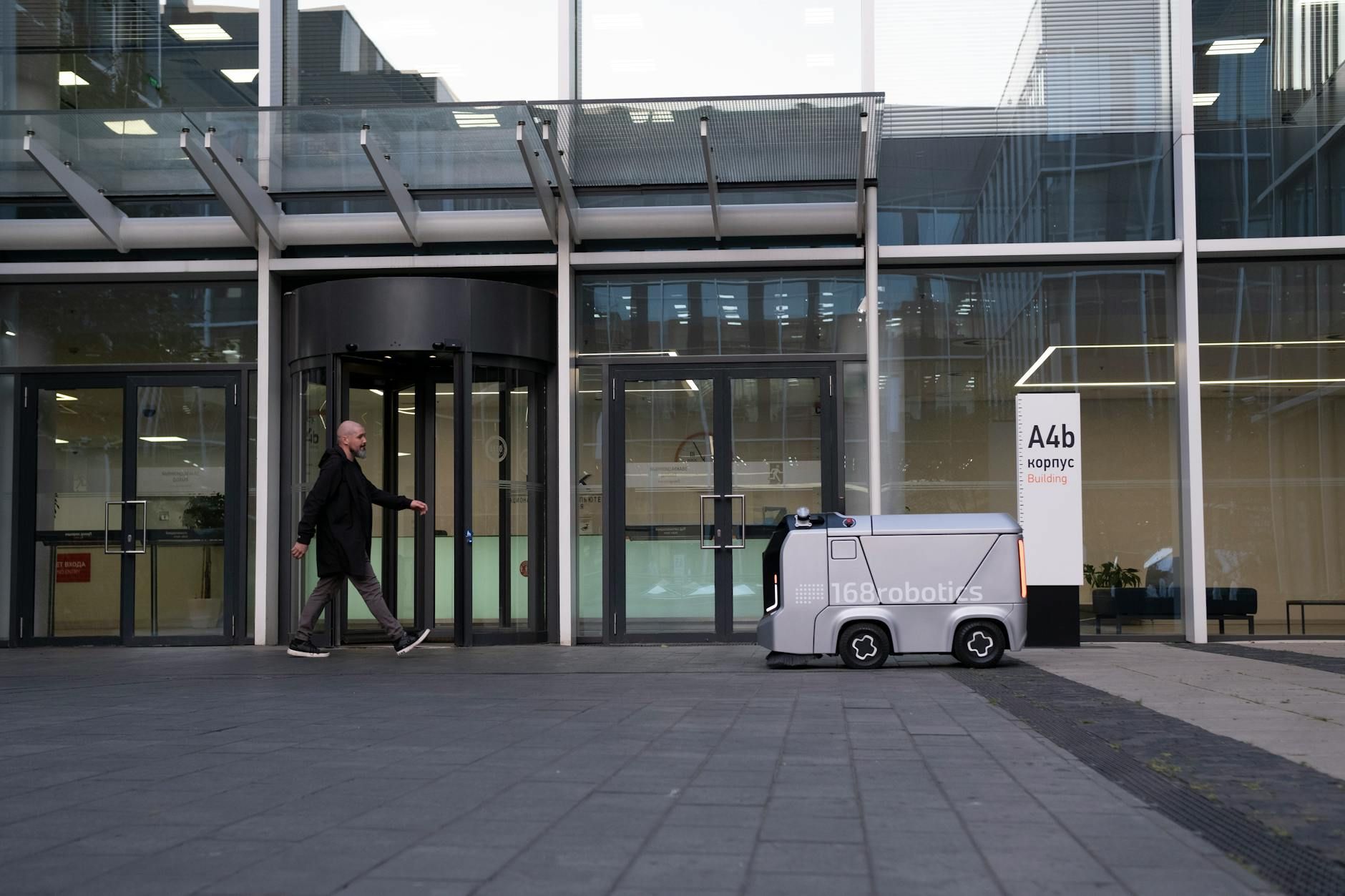ACA – Agentic Commerce Agency
Prepare Your Brand for Future with Enterprise AI Implementation
Enterprise AI implementation is no longer a futuristic concept reserved for tech giants. As a Canadian e-commerce director, CMO, or digital leader, you face growing pressure to keep your brand competitive, especially with the rise of generative search and agentic commerce. The combination of advanced AI capabilities and evolving consumer expectations means you need to act swiftly. By preparing your enterprise now, you stand to gain first-mover advantage in an increasingly AI-powered marketplace. Below, you will find an in-depth exploration of how enterprise AI implementation can future-proof your brand, along with strategic steps to adopt AI responsibly and effectively.
Understand the evolving AI landscape
AI is rapidly moving from simple automation to sophisticated business intelligence that can learn, adapt, and make decisions at scale. This shift has far-reaching implications for e-commerce, particularly as agentic shopping and generative search tools redefine how consumers discover and buy products. If you have been considering ai implementation roadmap or exploring business ai adoption , you already know that fully integrated AI solutions are quickly becoming a necessity.
AI’s move from narrow tasks to enterprise-scale
In the past, AI solutions were often limited to narrow tasks—for example, chatbots that handled basic customer-service queries. Thanks to ongoing breakthroughs in natural language processing and machine learning, AI now can manage end-to-end processes. Whether it is personalized product recommendations, dynamic pricing, or supply chain forecasting, AI’s ability to handle complex tasks with speed and accuracy has altered the competitive landscape.
Key drivers for change
- Greater affordability of AI technologies.
- Increased consumer demand for real-time personalization.
- Rapid improvements in computing power.
- Heightened competition among brands seeking advanced data insights.
By recognizing these market shifts early, you position your brand to capitalize on AI’s potential, reduce operating costs, and enhance customer satisfaction.
Recognize the impact of enterprise AI
When you integrate enterprise AI implementation across your organization, you unlock more than just automation. AI can optimize your workflows, expand your market reach, and uncover new growth opportunities. However, this broad impact requires strategic thinking about both current applications and future potential, particularly in the realm of agentic commerce.
Operational efficiency at scale
An immediate benefit you will see from enterprise AI is the ability to streamline operations. Tasks that previously took days or weeks—such as complex data analysis—can now be carried out in real time. By reducing human error in repetitive processes, you also minimize risk and increase overall efficiency.
- Automate manual workflows to boost productivity.
- Use predictive analytics to optimize inventory management.
- Streamline customer service with AI-driven self-service tools.
If you are exploring avenues for improved operational efficiency, business process automation ai could be your next step.
New revenue opportunities
AI-driven tools allow you to uncover products or services in your portfolio that have untapped potential. You might find new ways to price your offerings, create membership tiers, or launch personalized marketing campaigns that convert at higher rates. Over time, these improvements can significantly boost your revenue from e-commerce channels.
Competitive differentiation
In a saturated market, adopting ai for business efficiency enables you to stand out from competitors still relying on traditional methods. AI-driven personalization, for instance, can show each customer exactly what they are looking for. This level of relevance not only heightens the conversion rate but also reinforces brand loyalty.
Identify high-impact use cases
Before you invest in any AI tools, you need to determine which aspects of your business will benefit the most. Setting clear priorities—aligned with your brand’s unique strengths and challenges—ensures a faster and more significant return on investment. As you explore ai business use cases , remember that not every AI project delivers the same value.
Common starting points
- Demand forecasting: Predict inventory needs, lower wastage, and manage shipping times more effectively.
- Customer segmentation: Deliver hyper-personalized experiences and track engagement across multiple channels.
- Chatbots and virtual assistants: Resolve routine tasks quickly, freeing human agents for more complex work.
- Fraud detection: Strengthen your security by identifying abnormal transactions or patterns in real time.
Agentic commerce potentials
Agentic commerce refers to autonomous tools that can make purchasing decisions on behalf of consumers. As agentic systems gain traction, your brand could benefit from AI-capable platforms that can interpret product details, negotiate prices, or fully automate buying cycles. Being prepared for agentic commerce applications today sets you up for success in an environment where AI negotiates and transacts independently.
Build a strong AI foundation
Having a broad vision of what you want to achieve with AI is not enough. You need the right infrastructure, skill sets, and culture. Whether you plan to incorporate digital transformation ai strategies or simply begin with smaller AI pilots, a strong foundation will save you time and money in the long run.
Data readiness
Every AI-powered process starts with data. Ensure you have mechanisms to collect, clean, and securely store large amounts of information—this might come from your CRM, website analytics, social media engagement, or financial systems. The quality of your data will directly affect the performance of any AI model, making data integrity a top priority.
Scalable IT infrastructure
Your enterprise AI models will likely need significant computational resources. Cloud-based solutions, on-premise data centers, or hybrid models all have their advantages. Ensuring your infrastructure can handle the load without compromising on performance or security is crucial. For some companies, it may be more cost-effective to outsource initially or collaborate with providers who specialize in ai-powered business operations.
Cross-functional collaboration
AI initiatives rarely succeed in silos. As you plan for business ai integration , make sure to involve multiple stakeholders: IT teams, data scientists, marketing leads, and top-level executives. Effective communication across different departments helps you build a more seamless AI ecosystem and fosters a culture of innovation.
Overcome common AI challenges
Enterprise AI implementation carries its share of hurdles. Identifying them early helps you avoid setbacks and keep stakeholders on board. If you find yourself concerned about project costs or complexity, resources like ai implementation challenges can point you toward proven solutions.
Funding and ROI
AI projects can be expensive to launch, especially if your infrastructure or data pipelines need an overhaul. You should present a clear ROI analysis showcasing both tangible and intangible benefits. Combining a phased investment strategy with early wins—like small-scale proofs of concept—can ease executive concerns about upfront spending.
Data security and privacy
AI thrives on data, but data handling comes with regulatory and ethical risks. Make sure you comply with privacy laws such as Canada’s Personal Information Protection and Electronic Documents Act (PIPEDA). Build an internal compliance framework to avoid mishandling sensitive information. This not only protects your brand reputation but also encourages consumer trust.
Managing resistance to change
Introducing new technologies often prompts skepticism from employees or key partners. Clear communication about the benefits, alongside transparent performance metrics, can ease concerns. Offering training programs and involving staff in the testing phases empowers them to embrace AI rather than fear it.
Craft a holistic AI implementation roadmap
A structured plan is the cornerstone of successful AI adoption. Your roadmap should outline your current capabilities, desired outcomes, timelines, and required resources. You might take inspiration from implementing ai in business guides, but make sure each phase is tailored to your unique context.
Map out goals and milestones
Start by breaking down your AI objectives into smaller, manageable milestones. For example, Phase 1 can focus on data readiness, Phase 2 can develop initial use cases, and Phase 3 can scale solutions across the enterprise. Setting realistic deadlines also helps you manage budget and resources effectively.
Pilot, measure, and iterate
Begin with small pilots targeting well-defined problems. Pilot outcomes, whether successful or not, will surface lessons that help you refine future phases. Establish performance metrics—such as reduction in churn rate, improved conversion rate, or time saved—and track them regularly. Continual improvement is a hallmark of any successful ai project implementation.
Align with long-term vision
Enterprise AI is an ongoing journey, not a one-off deployment. As you progress, ensure your AI ambitions stay aligned with your broader strategic vision. If your end goal is to excel in agentic commerce, incorporate relevant stages in your roadmap—such as building the capacity for dynamic pricing algorithms or real-time inventory updates.
Strengthen team capabilities
No matter how sophisticated your AI tools are, successful implementation hinges on the people who use them. Upskilling your existing workforce or hiring individuals with AI expertise can transform your organization’s culture and accelerate adoption.
Recruit or train data-savvy talent
If you do not already have data scientists, machine learning engineers, or AI-focused software developers in your team, consider expanding your hiring strategy. Alternatively, explore upskilling options for current employees who have strong analytical backgrounds. By fostering talent growth, you build an internal community that understands the intricacies of enterprise AI implementation.
Encourage AI literacy company-wide
AI is not just for tech teams. From marketing managers to finance leads, every department can reap the benefits of AI-driven insights. Offering company-wide training sessions ensures each team recognizes the value of AI in their specific role. This broader literacy also promotes cross-departmental collaboration, essential for maximizing AI’s impact.
Integrate AI into existing systems
The real power of enterprise AI implementation emerges when new solutions integrate seamlessly with your existing infrastructure. Whether it be your CRM, ERP, or e-commerce platform, the ability to interface with current tools makes AI adoption more cost-effective and less disruptive.
Evaluate your technical architecture
Conduct a thorough assessment of how data flows through your organization today. Determine which systems should be upgraded or replaced to avoid getting bottlenecked by legacy software. Integration platforms or specialized AI middleware can spare you the added costs of rebuilding from scratch.
Maintain data consistency
Your AI models will not function properly if they rely on inconsistent or siloed data sets. Ensure frequent data reconciliation among various systems—particularly if you have separate platforms for marketing, logistics, and customer service. Solid data governance is invaluable here.
Leverage agentic commerce opportunities
Agentic commerce, in which AI-powered tools make purchasing decisions on behalf of consumers, is on the cusp of mainstream adoption. By preparing for agentic commerce technology , you can serve customers more proactively and strike deals faster.
Adapting your products for agentic platforms
Agentic systems thrive on structured, well-labeled data. Product descriptions should be clear, with essential details like pricing, shipping, and return policies easily machine-readable. If your brand is discoverable and easy to negotiate with, agentic platforms are more likely to recommend your products to interested buyers.
Building trust with autonomous agents
Consumers will want reassurance that the AI tools making decisions on their behalf are secure and unbiased. Whether you are establishing an agentic commerce strategy or adding AI-driven features to your website, transparency is key. Provide easily accessible information on how your AI models gather and process data, and highlight how your brand protects consumer interests.
Manage ethical and regulatory considerations
With great power comes great responsibility. Enterprise AI can analyze and leverage vast amounts of data, creating both compelling enhancements to your business and potential ethical pitfalls.
Bias and fairness
AI models learn from the data they are fed. If that data is biased—intentionally or inadvertently—your AI-driven decisions could systematically disadvantage certain groups. Addressing bias is especially critical for brands that rely on personalized product recommendations or credit assessments. Regularly audit your AI outputs to ensure fairness, and retrain your models if necessary.
Compliance with data laws
Canadian laws, including PIPEDA, regulate how businesses collect, store, and use personal information. Depending on your industry, you may also need to follow international standards such as the General Data Protection Regulation (GDPR) if you cater to European markets. Noncompliance can lead to hefty fines and reputational damage, so treat legal requirements as integral to your AI planning.
Monitor KPIs and refine continually
AI-driven models are never finished products. They require ongoing oversight to address shifting consumer behaviors, competitive dynamics, and technological advancements.
KPI tracking
Set specific, quantifiable targets for each aspect of your AI initiative. Potential metrics to watch could include:
- Conversion rate across AI-powered campaigns
- Average fulfillment time for orders
- Customer satisfaction scores from AI-enhanced interactions
Monitoring these KPIs helps you understand where AI is delivering value and where it needs fine-tuning.
Iterative model tuning
As your brand grows, your AI models will need regular updates. Decision thresholds, training data sets, or even entire algorithms might need to be reconfigured to handle new products, channels, or consumer expectations. Staying on top of these updates keeps you competitive in fast-evolving markets.
Make AI part of your brand identity
Successfully integrating AI into your day-to-day operations can differentiate you as a forward-thinking leader. When your customers, investors, and employees see your willingness to embrace intelligent automation, you earn a reputation as a brand that invests in innovation.
Communicate your AI vision
Internally, share progress stories of how AI is transforming the organization. Publicly, highlight success stories that show how customers benefit from your AI-driven improvements. Whether you are lessening delivery times or tailoring marketing campaigns, let stakeholders know the role AI plays in these advances.
Collaborate and co-innovate
AI is evolving rapidly. Keeping your brand at the forefront might involve partnering with specialized providers, forming industry alliances, or investing in research. Co-innovation can lead to mutually beneficial solutions that expand your AI capabilities and extend your market reach. If you find your teams lacking certain expertise, exploring how to collaborate with agentic commerce solutions could be an option.
Protect long-term stability
As AI matures, new opportunities and risks will emerge. Building contingency plans, crisis response protocols, and strong governance around AI ensures that your investments remain secure and adaptable.
Risk management frameworks
Develop guidelines for AI-related failures or anomalies. If a miscalculation leads to overspending on inventory or misaligned product recommendations, you need a swift response plan. Building a risk management framework for your AI systems protects your finances and brand reputation.
Update governance policies
Create an AI governance board or assign a leadership team to oversee all AI-related activities, ensuring alignment with legal requirements and ethical standards. Effective governance keeps your AI initiatives running smoothly and protects you from lapses in oversight.
Explore future applications
Enterprise AI implementation is not a one-and-done project. In a world pivoting to agentic commerce, ongoing expansions and new modules will become essential. Sophisticated recommendation systems, automated negotiations, and real-time market adjustments are just the beginning.
Embrace advanced technologies
AI is often most powerful when combined with other innovations, such as blockchain for secure transactions or the Internet of Things for real-time product tracking. Always keep an eye on emerging technology trends that can amplify your AI initiatives, while also staying focused on your core business objectives.
Scale fearlessly
Once your initial AI projects have proven successful, scale them across multiple business units. Expand your graphical dashboards and reporting systems so you have enterprise-wide visibility. Greater scale does not just mean more of the same, but also deeper insights and more nuanced decision-making.
Action plan to move forward
Below is a concise checklist to ensure your enterprise AI plans stay on track:
- Establish your AI vision
- Define how AI will align with your business goals
- Secure executive buy-in
- Assess data sources and quality
- Collect, clean, and secure data for AI modeling
- Evaluate current systems for any data gaps
- Develop a phased implementation roadmap
- Prioritize high-impact use cases
- Set milestones and allocate budgets
- Build cross-functional teams
- Recruit specialized talent or train existing staff
- Encourage AI literacy across the organization
- Integrate with existing infrastructure
- Identify limiting legacy systems
- Adopt or build connectors, APIs, and middleware
- Address challenges and risks
- Create security and compliance protocols
- Plan for stakeholder alignment and change management
- Pilot, measure, and iterate
- Test on a smaller scale
- Refine strategies based on measurable metrics
- Stay updated on agentic commerce
- Optimize your product data for autonomous agents
- Prepare for more advanced, AI-driven B2C and B2B transactions
- Communicate successes
- Share KPIs and results internally
- Highlight brand differentiation in marketing campaigns
- Prepare for continuous improvement
- Keep AI models updated and relevant
- Undergo periodic audits to ensure quality and compliance
By following this plan, you set your organization up for a steady transition into a new era of AI-enabled commerce.
Take the next step with confidence
Your journey toward enterprise AI implementation may feel complex, but the opportunities to enhance efficiency, personalization, and brand differentiation are unparalleled. By adopting AI in a structured, responsible manner, you will not only meet today’s consumer demands but also anticipate tomorrow’s market shifts.
If you are ready to transform your brand’s future and outpace competitors, you do not have to navigate this alone. Agentic Commerce Agency specializes in guiding businesses like yours through AI adoption, agentic commerce strategies, and beyond. For tailored support and a clear roadmap, visit our website at https://agenticcommerceagency.ca/ or contact us directly. Let’s work together to build your enterprise AI foundation and secure your place in the emerging era of intelligent, autonomous shopping.
SHARE THIS POST:
Leave A Comments:
Our Recent Posts:







